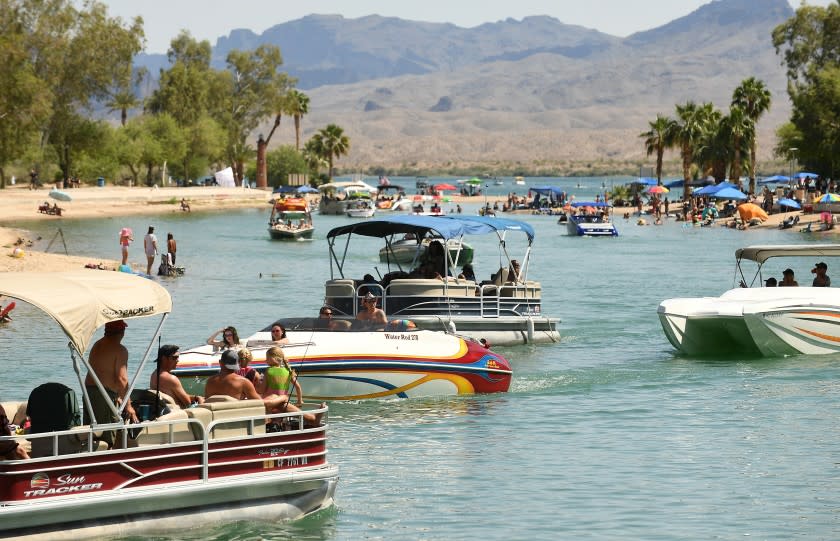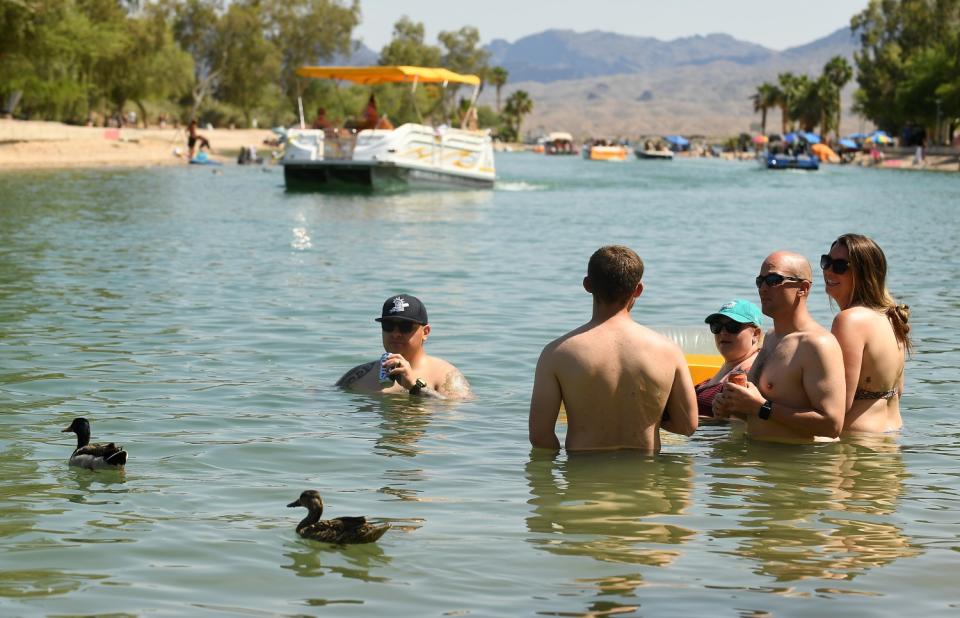Stir-crazy Californians are crowding Arizona's Lake Havasu

Every year, the seasons in Lake Havasu City, Ariz., are marked by the arrival and departure of tourists.
The retirees with second homes fly down in the fall and leave in April, right around the time spring breakers descend upon Lake Havasu, the 19,300-acre turquoise oasis that straddles the California-Arizona border.
This spring, though, there were no college revelers shotgunning cans of beer on pontoon boats. The lake was relatively quiet in March as the usual visitors self-quarantined at home. The city's economy, heavily reliant on tourism, suffered.
And then came the Californians.
“Every weekend has been like a holiday weekend on the lake,” said Robert Koerber, an air conditioning contractor in Lake Havasu City.
As much of California closed down its beaches in the face of the deadly COVID-19 pandemic, Golden Staters looking for freedom and respite from the heat have flocked to Lake Havasu.
Friday through Sunday, trucks hitched with boats have congested city streets, with as many as 70 boats waiting for a single ramp, locals said. Gas stations have sold out of fuel and beer. Hotels have filled up.
While many locals are grateful for the tourism dollars amid a global downturn, some are worried that the crowds could cause a rise in coronavirus cases locally and overwhelm the city's only hospital, which has just 16 ICU beds for its 55,000 residents.
"I think people are getting bored of the shutdown so they think it should just be over, and they're coming here to explore," said resident Cory Hall. "I really wish they would stay away right now."
Cal Sheehy, the city's mayor, on April 3 told visitors to do just that, three days after Arizona Gov. Doug Ducey issued statewide stay-at-home orders.
"Lake Havasu City has always been a special place for visitors, but we ask that you stay home to protect the safety of our citizens and you during the COVID-19 pandemic," Sheehy said in a statement.
That message has done little to deter tourists.
Sandbar Powersports manager Jason Melton said that the boat rental shop's phone has been ringing nonstop since it reopened May 4, when some businesses in Arizona were allowed to resume walk-up services.
The shop, which usually rents two or three boats a day in the spring, has more than doubled its business during the first week of May. Most renters are from California.
"A lot of our customers are freaking out because they need to get out of the house," Melton said. "They can't take it anymore."
Lars Negrette, a 30-year-old machinist in San Bernardino, has planned a vacation with two other families at Lake Havasu for early June. He visits the lake a few times each summer with his young daughter and girlfriend, and he doesn't see why this year should be any different.

His family's lake routine will be the same as always. They'll stay at their usual motel. They'll stop at Subway, gas up the boat and get on the water early. They'll wakeboard and tube.
Negrette believes he had the virus in December. He's not worried about potential exposure at the lake. "I'm over this whole thing," he said of the pandemic.
Residents were most concerned by the influx of tourists in early April, when more than 4,200 people signed a Change.org petition to close Lake Havasu.
Khamranie Persaud, a doctor, helped organize the petition after it became clear that the visitors weren't just visiting the lake and going home. They were staying overnight, buying ice at crowded launch ramps and stocking up at grocery stores, taking their food and supplies back to larger cities.
Persaud didn't actually want the lake closed, she said. She knows that the lake, fed by the Colorado River, is a federal waterway. The city can't restrict access to it. And it's easy enough for people to socially distance while recreating on the vast reservoir; many people made this point in an opposing petition to keep the lake and channel accessible.
"A lot of people don't want visitors here, but I don’t think they should restrict movements of their fellow American citizens because they’re afraid," said Koerber, who signed the petition.
Ultimately, Persaud wanted to raise awareness about the potential danger of congregating in areas near the lake.
"As a physician, I always err on the side of caution because at the end of the day, the worst-case outcome here is death," she said. "And you don’t want to put a large amount of people, especially our population, in a higher-risk situation than is necessary."
A third of Lake Havasu City's population is 65 or older, compared with 18% in all of Arizona, according to U.S. census data.
The conservative-leaning city hasn't seen a spike in cases so far. As of Sunday, 45 residents have tested positive for the virus and four have died of COVID-19 complications.
Few full-time residents go out to the lake on busy weekends, so Persaud speculates that they are somewhat insulated from the crowds.
"Are these people on the lake going back to their home state and testing positive there?" Persaud asked. "We don’t know."

One of the lake's most popular launch ramps is at Lake Havasu State Park, 2.5 miles of white-sand shoreline. The park is admitting 2,500 people for day use, half of its usual capacity. All visitors are given a handout reminding them of CDC guidelines: Limit groups to 10 people or fewer, socially distance, cover your face when sneezing and coughing.
"We still have to ask people to separate," said park manager Dan Roddy. "It’s difficult because a lot of times they’re family members, three cars full who've come together in the park and you gotta split them up."
Most are compliant, Roddy said. But 20 or so have refused to disperse and were asked to leave the park. The manager said he's surprised by the number of visitors who don't seem to understand why the rules are in place.
Sheehy, the mayor, said that although he could have done more to keep visitors away, such as shutting the city-owned launch ramp or closing certain roads that lead to the lake, doing so would be a "slippery slope."
"That’s not a direction I think we should take," said Sheehy, who is also the general manager of a lakefront hotel. Sheehy closed the lake's public restrooms for a few weeks and reopened them in early May.
Complicating the matter is that many of the visitors have second homes in Lake Havasu City.
One of those part-time residents is Lara Martin of Riverside. Lake Havasu is an escape for Martin, her husband and her 12-year-old daughter, particularly during the pandemic. Arizona is a bit more "laid back," the high school business teacher said.
For example, Riverside residents are required to wear masks when they go outside. But Martin has noticed that hardly anyone in Lake Havasu City covers their face.
Martin said she won't let fear keep her from enjoying the lake.
"It can happen to anyone, unfortunately," she said of contracting the virus. "Anyone can also be hit by a car or drunk driver. Life is not guaranteed at a certain age."

